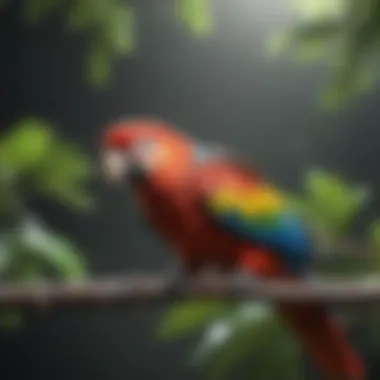Exploring Factors Affecting Pet Birds' Lifespan


Intro
When bringing a pet bird into your home, one of the foremost considerations is how to support its longevity. The lifespan of pet birds varies significantly across species, influenced by their natural traits and home environment. Understanding these nuances is critical for pet bird owners. Just as with any companion animal, informed decisions regarding their care will enhance their well-being, directly contributing to a longer life.
In this piece, we will examine several essential aspects that affect avian longevity. These include nutrition, habitat setup, social interaction, and avian health. By gaining insight into these factors, bird owners can improve the quality of life for their pets, ultimately ensuring they thrive.
Avian Care Basics
Caring for birds involves more than supplying a cage and food. A holistic approach is vital for maximizing their lifespan and well-being. Understanding their fundamental care needs lays the groundwork for sustainable health.
Importance of Proper Nutrition
Nutrition must at the forefront of every bird owner's mind. Birds, much like humans, should have a balanced diet tailored to their species. The diet may consist of high-quality seeds, pellets, fresh fruits, and vegetables. For instance, parakeets benefit from vitamins found in vegetables, especially dark leafy greens.
Key nutrients to consider include:
- Vitamin A: Important for vision and immune function.
- Calcium: Vital for strong bones and eggshells in lay females.
- Omega-3 Fatty Acids: Support feather and skin health.
Warning: Certain foods, including avocado and chocolate, can be toxic for birds.
Understanding Bird Species and Their Needs
Every bird species is unique, with differing dietary needs and environmental demands. Understanding these variations is essential. Larger birds, such as macaws, require different care than smaller species like finches. Researching the needs specific to your pet bird can help inform decisions on nutrition and habitat setup.
Basics of Birds Habitat Setup
A suitable habitat is crucial. Birds require adequate space to move, play, and feel secure. When setting up your bird’s environment, consider:
- Cage Size: Ensure it allows for wing stretching.
- Perches: Use varied diameters to promote foot health and interest.
- Climbing Structures: Birds need exercise, so provide items to climb.
Having enrichment items, such puzzles or toys, will stimulate creativity and reduce boredom.
Grooming and Hygiene Tips
Regular grooming keeps birds healthy. Bathing and nail trimming are essential components of care. Most birds enjoy water baths which not only promote hygiene but also feather condition. Additionally, hormonal issues can be managed with regular nail trimming.
Interacting with Your Pet Bird
Interaction strengthens the bond between owner and bird. Birds are social creatures, and understanding their communication helps foster a trustful relationship.
Building Trust and Connection
When new to your home, a bird may exhibit reserved behavior. Slow, steady interactions encourage comfort. Quiet voices and hand movements help build this trust. When your pet begins to approach, it displays socio-affectionate behaviors.
Training Techniques and Tips
Birds are intelligent and capable of learning tricks, forming new habits, and responding to cues. Training needs patience. Clear, consistent commands will facilitate learning. Positive reinforcement, like treats or praise, will motivate your bird to respond favorably.
Fun Activities for Bird Owners and Their Birds
Engaging with your bird in play can include towel play, outdoor walks in an avian harness, or targeted tricks. Interactive moments can fortify the connection between human and bird, translating into a happier, healthier life for both.
Recognizing Bird Cues and Behaviors
Birds exhibit various behaviors that signal their mental state. Recognizing these can prevent stress. If a bird puffs its feathers, it may be chill, while aggressive signaling like flapping and beak snapping may require attention to change the environment.
Emotional Well-Being of Birds
An often-overlooked aspect of pet bird care is fostering emotional stability. Birds thrive when they feel secure and happy, conditions driven largely by their interactions.


The Role of Play and Socialization
Regular social exchanges, playtime, and interaction within and between species substantially enhance their mental health. Birds can get lonely, so consider two birds if time for interaction is an issue.
Enhancing Birds' Emotional Health
Employing routines and predictability creates comfort for birds. You might note their favorite activities, which may differ seasonally. Pacing plays a crucial role, allowing birds time to play and wish to rest afterward.
Assessing Bird Stress and Remedies
Signs of stress could include excessive vocalization or plucking. Reducing stressful stimuli, ensuring a quiet environment, and promoting space can be essential solutions. Observing changes in habits under varying circumstances can alleviate many potential stressors.
Building Strong Human-Bird Bonds
Long-lasting bonds manifest when both parties feel comfortable. Frequent interactions, speaking gently, and not rushing toward a bird translate to a relaxed relationship. This delta goes along way in prolonging overall animal welfare.
Bird Health and Safety
Maintaining a safe and health-centered environment fosters longevity and happiness for your pet.
Common Health Issues and Prevention
Some birds are diagnosed with diseases prone to specific species. Regular visits to an avian veterinarian are key, as some concerns may not initially be observed. Common issues are obesity, egg-binding in hens, and feather plucking.
Routine Veterinary Care
Prioritize flight checks when moving to a new habitat or before dietary changes to ensure well-being. Avian specialists will administer necessary vaccinations and ensure complete parasite checks.
Environmental Hazards to Avoid
Certain household items, from toxic plants to chemicals in cleaners, may pose risks for birds. It is pivotal to recognize factors at home that could endanger avian life. Inspect locations where farmers can emit fumes, such as kitchens and around paints.
Signs of Illness or Distress
Pay attention to changes in behavior such as changes in texture of feathers or different vocal patterns. No vasational indicator of spending behavior might indicate medical limitations. Being agile and perceptive can elongate lifespan with proper care.
Fun Facts and Quirky Insights
Birds fascinate people for myriad reasons beyond companionship. Their evolution, utility, and distinct performances exhibit a bizarre range of features worthy of admiration.
Unique Traits of Popular Bird Species
Different species come adorned with unique colors, songs, and even personalities. Budgies are known as chatterboxes, while cockatoos can dance showing social adaptability. Learn to appreciate these easy going creatures because grabbing eye adds richness to our environment.
Historical and Cultural Significance of Birds
Birds have shaped various cultures from “doves” symbolizing peace to owls often representing wisdom. They feature prominently in literature and dominate mythology; observing their lives adds historical insight.
Famous Bird Owners and Their Stories
Many figures have found joy in pet birds. Notable artists, such as Picasso, often adored holding interactions, seeing birds materialize creativity. Evaluating connections human-wildlife drives evolfund, reflecting societal values through time.
Admonishing their complexity serves vital focus, magnifying past relationships conditioning kindness towards modern compassion.
Foreword to Pet Birds and Their Lifespan
Birds are not just beautiful companions, they, are a commitment. Owners need to grasp the various elements influencing their Lifespan. This knowledge is key to fostering a healthy and enriching environment for their feathered friends. The right care can make a considerable difference to the number of years that birds live. It's not purely biological; environmental factors, comfort, and nutrition play influential roles as well. Pet birds require attention to their nutrients along with a stable and relaxed environment.
Complex interactions of care strategies direct attention to measures that boost well-being. Comprehending pet birds’ lifespan is a step toward cultivating a resilient and vibrant lifestyle for them. Defined by multiple components, longevity is not simply a matter of species but involves personalized care and understanding.
What Determines Bird Lifespan?


A collection of diverse elements determines how long each bird can thrive. Genetic makeup stands at the forefront. Inherent tones found through species can display significant variations in internal health. Some birds are bred for genes focusing on extended Lifespan, while others may lack such traits.
Further influencing factors include environmental stability. Birds enjoy some living conditions ther are conducive to health. Pollution, temperature fluctuations, and social dynamics affect their levels. Equally notable, a proper diet is crucial for optimium Nutrition support, catering to vitamins and minerals necessary for robust living. Outside influences can customarily make an importance of healthy social interactions with avian friends and human caretakers, all leading to improved immunity and longevity.
Understanding these components endings up demonstrating how connected these variables are with the Lifespan of birds. Perspectives of genetic, environmental quality, balanced diet, and social needs coexist to create a long-lasting bond between owners and birds.
Overview of Average Lifespan by Species
Bird species present differing average lifespan metrics. Each species harbors unique biological and life intricacies.
- Canaries: Typically ♬293, if well-cared for, express life up to fifteen years.
- Parakeets (Budgerigars): The lively Budgerigar often whispers into hearts with a life spandied ding relying as much on care, shrinking variance ranging from seven to ten years.
- Cockatiels: These charming birds can commonly endure more rabbit lives lasting around fifteen to twenty years when given proper attention.
- African Grey Parrots: Renowned for their intelligence, African greys frequently exceed eighteen to twenty five years in captivity.
Growth mechanics conclude an acquired understanding. Each bird uniqueness in lifespan demands introspection into respective attendees and diverse care fertilizations. IdentifyingLifespan average can help inform pet owners about what to expect through their journey. Ensuring minute consideration affords the bird owners a better view toward live expectations.
Key Factors Influencing Lifespan
The longevity of pet birds is not merely a matter of chance or random genetics. It hinges on several key factors that interact dynamically Throughout a bird’s life. Understanding these elements is essential for pet bird owners, aspiring bird parents, and breeders. Factors such as genetics, environmental conditions, nutritional needs, and social interactions all contribute significantly to the lifespan of these avian companions.
Genetic Factors
Genetics play a crucial role in determining lifespan. Each species of bird carries distinct genetic traits that can influence how long it lives. For example, larger bird species, like macaws, generally exhibit longer lifespans compared to smaller species, such as finches. Breeders might inadvertently pass on hereditary health issues related to genetics. Recognizing these patterns can help owners make informed decisions when selecting a bird. Knowing which species typically thrive in specific environments will significantly influence longevity.
Environmental Conditions
The environment in which a bird is kept affects its health and well-being. Appropriate habitat design residue in aviaries ensures adequate space, clean conditions, and proper ventilation. Birds should have access to natural light and be shielded from abrupt temperature changes. It’s also advisable to minimize stress factors, such as loud noises or unwanted predators. A calm and suitable environment can set the stage for better health.
Nutritional Needs
Proper nutrition cannot be emphasized enough. The dietary requirements vary greatly among bird species. For instance, seeds alone might not provide all the necessary nutrients for parrots or cockatiels. Owners should aim for a balanced diet, incorporating fresh fruits, vegetables, and specially formulated pellets. Birds with inadequate nutrition may experience shorter lifespans and health complications over time. Establishing a routine for dietary assessment and adjustment holds significant value.
Social Interactions
Birds are inherently social creatures. Social interactions with humans and other birds can have stimulating effects on their psychology and overall health. Isolated birds may show signs of depression or behavioral issues, which can lead to deteriorated health and a shorter lifespan. By encouraging engagement through play and interaction, owners can create a more enriching existence for their pets while bolstering their emotional and mental health. Regular social interactions need thoughtful consideration by any bird owner.
Frequent monitoring of these key factors empowers bird owners to foster healthier environments, thus improving their pets' overall quality of life.
Species-Specific Lifespan Examples
Understanding species-specific lifespan examples is critical for pet bird owners. Each species has unique traits that influence their longevity. By knowing these characteristics, caregivers can adjust care practices and environments to promote longer, healthier lives for their birds. Species insights help in selecting the right pet and managing expectations about their care needs.
Canaries
Canaries typically have a lifespan of 10 to 15 years. They are known for their varied colors and beautiful songs. Their wellbeing is greatly affected by their nutrition and habitat. Properly designed cages with adequate space, alongside a balanced diet, can significantly extend their lives. It's important to provide fresh fruits and vegetables, and a source of calcium to promote good health. Overcrowding in cages can increase stress and lead to shorter lifespans.
Parakeets (Budgerigars)
Parakeets tend to live around 7 to 15 years. These birds are social creatures that benefit from interaction with humans and other birds. Inadequate socialization may lead to stress, which can shorten their lives. A consistent routine, engaging activities, and varied environments can enhance their quality of life. They thrive with a diet including seeds, pellets, and fresh produce. Always monitor them for signs of illness, as early intervention can be key to lengthening their lifespan.
Cockatiels
Cockatiels can live up to 15 to 25 years, depending on their care. Their friendly nature requires regular social interaction, which keeps them happier and healthier. A cage should be spacious, allowing for flight and play. Their diets also need to be rich in seeds, nuts, and vegetables. They are particularly prone to obesity, which can endanger their health. Regular vet check-ups can help prevent health issues.
African Grey Parrots
African Grey Parrots have a lifespan that can reach 30 to 50 years, making them long-term companions. They are highly intelligent birds that require mental stimulation. An enriched environment with toys, foraging activities, and appropriate social interaction are key factors. Their diet needs to be varied, including pellets, fruits, and vegetables to ensure optimal health. Regular stress management and preventive care will help maintain their longevity, emphasizing their complex emotional needs as pets.
"A well cared for bird has increased chances of a longer, healthier life."
Given the diversity in lifespans among pet birds, understanding species specifics is crucial for owners. Proper preparation and commitment are essential to ensure these fascinating creatures live their fullest lives.


Health Considerations Throughout a Bird's Life
Understanding health considerations is essential for pet bird owners who want to maximize their flock's duration of life. Birds, as pets, face unique health challenges. Knowledge about their potential issues provides a foundation for proper care, ensuring both well-being and longevity. In this section, we will explore common health issues that birds encounter and preventative care measures that can make a significant impact on their health.
Common Health Issues
The health of pet birds can be impacted by various factors. Below are some common health problems to be aware of:
- Obesity: Many domestic birds live sedentary lives. A high-calorie diet without appropriate exercise can lead to obesity. This condition often causes heart disease and could shorten lifespan.
- Feather Plucking: This self-destructive behavior often arises from stress or boredom. Birds plucking feathers can hurt themselves and impact their appearance and health.
- Respiratory Issues: Birds are sensitive to environmental toxins like fumes from non-stick pans or mold. Respiratory problems can be severe and require immediate attention.
- Gout: Gout develops from an excess of uric acid in the bloodstream. Factors like highly protein diets can instigate this complication, which may lead to joint pain.
- Psittacosis: This is a bacterial infection common among parrots. It may cause respiratory distress, and it is transmissible to humans, making it particularly concerning.
- Egg-Binding: This medical emergency occurs when a female bird is unable to pass her eggs. Immediate veterinary care is necessary to avoid severe health problems or even death.
Regular vet check-ups help in the early detection of such conditions, which is vital in tailoring the right care.
Preventative Care
Preventative care is crucial for aiding pet birds in maintaining good health throughout their lifespan. Here are important elements to consider:
- Regular Health Check-Ups: Routine veterinary visits can catch health issues before they escalate into larger problems. Aim for at least once a year, but higher frequency may be needed for older or ailing birds.
- Balanced Diet: Proper nutrition is a cornerstone of good health. Offer a mix of seeds, pellets, fruits, and vegetables. Limiting treat consumption to special occasions keeps weight in check.
- Clean Environment: A tidy habitat promotes overall well-being. Clean food and water dishes daily, and regularly change bedding to minimize bacterial growth and pests.
- Social Interaction and Mental Stimulation: Engaging toys help keep birds mentally sharp and reduce stress. Healthy social interaction is also vital; without it, birds may become depressed or develop behavioral issues.
- Avoiding Toxins: Many common substances found in homes can be toxic to birds. Avoid using certain household cleaners and prioritize bird-safe materials.
By understanding common health issues and implementing preventative care measures, pet bird owners can enhance their bird's quality of life, reliability, and enduring companionship. A focus on sustaining health will affect overall bird behavior and happiness.
Enhancing Lifespan Through Proper Care
Enhancing the lifespan of pet birds is a multifaceted topic that references the intricate relationship between the care provided and their overall well-being. Bird owners play a significant role in dictating this narrative. The following aspects not only contribute to a longer life but also enrich the quality of life for these captivating creatures.
Establishing a Balanced Diet
A balanced diet is essential for the health and longevity of pet birds. Just as we focus on the nutrition of our diets, birds require wholesome foods tailored to their specific species needs. Seed diets often lack essential vitamins and minerals. A diet comprising fresh fruits, vegetables, and specially formulated pellets can encroach on many health issues that might arise from inadequate nutrition.
- Key Components to Include in Diet:
- Fresh fruits like apples and berries
- Vegetables such as spinach and bell peppers
- Quality pellets enriched with nutrients
Providing a variety ensures they not only receive necessary nutrients, but it also adds vital stimulation and enrichment to their day-to-day activities. Therefore, avoid repetitive diets to prevent boredom and encourage a healthy appetite.
Creating a Stimulating Environment
Birds thrive in environments that engage their natural instincts. A stimulating atmosphere encompasses physical space, enrichments, and activities that reflect a bird’s needs for exercise and mental challenges. If a bird resides in an unstimulating area, boredom can lead to significant behavioral issues and health complications.
Consider the following to bolster their habitat:
- Caging Options: Ensure sufficient size for movement and exercise.
- Toys: Introduce an array of toys—shreddable materials, foraging toys, and those that produce noise can activate a bird's mind and lead to playfulness.
- Social Interaction: Engage in active play. Birds appreciate activities like hide and seek or mirror play.
Such factors coalesce to create an environment where they can express and fulfill their natural instincts. Conclusively, mental engagement equates to prolonged physical welfare.
Encouraging Social Interaction
Birds are inherently social> creatures and favor strong bonds with their owners or fellow pets. Social interactions are crucial in preventing loneliness and fostering emotional wellness. Without viable social relationships, birds could experience stress, resulting in then detrimental health implications.
- Ways to Encourage Interaction:
- Regularly handle and talk to your bird to develop trust and companionship.
- House birds together if species compatible—for instance, keeping finches in pairs unleashes natural behaviors.
Social engagement proves beneficial and necessity in a bird's life, hence actively fostering connections can substantially enhance their emotional health and longevity.
Epilogue
In summary, the lifespan of pet birds is influenced by multiple factors that are indeed crucial for any owner to comprehend. Understanding what contributes to their longevity can assist owners in creating the conditions necessary for their feathered companions to thrive.
Notably, recognizing specific species traits lays the groundwork for appreciating the different needs of each bird. Species like African Grey Parrots may demand more intricate environments due to their high intelligence when compared to less demanding species like canaries. Additionally, knowledge about potential health issues allows bird owners to be proactive in their bird's care.
Future Considerations for Bird Owners
For pet bird owners, there are several important considerations to keep in mind as they care for their avian friends:
- Continuing Education: Birds can exhibit behavioral changes due to age or health. Staying informed on avian care helps owners recognize these changes quickly.
- Regular Veterinary Check-ups: Regular screening is vital in avoiding undetected health issues that could otherwise affect the bird's lifespan.
- Adapt the Environment as Birds Age: As birds grow older, their needs can change. Owners should regularly assess their habitat design to ensure it meets the standards required for comfort and stimulation.
- Observing Nutritional Trends with Age: Just like any pet, dietary adjustments may be necessary as a bird ages. Finding and providing species-specific diets meet their changing energy and health needs.
Understanding these considerations helps ensure that caregivers maintain a harmonious relationship with their pet birds throughout their lifetimes. By focusing on these specific elements for care, owners not only enhance the quality of life for their birds but also strengthen the human-bird bond.















